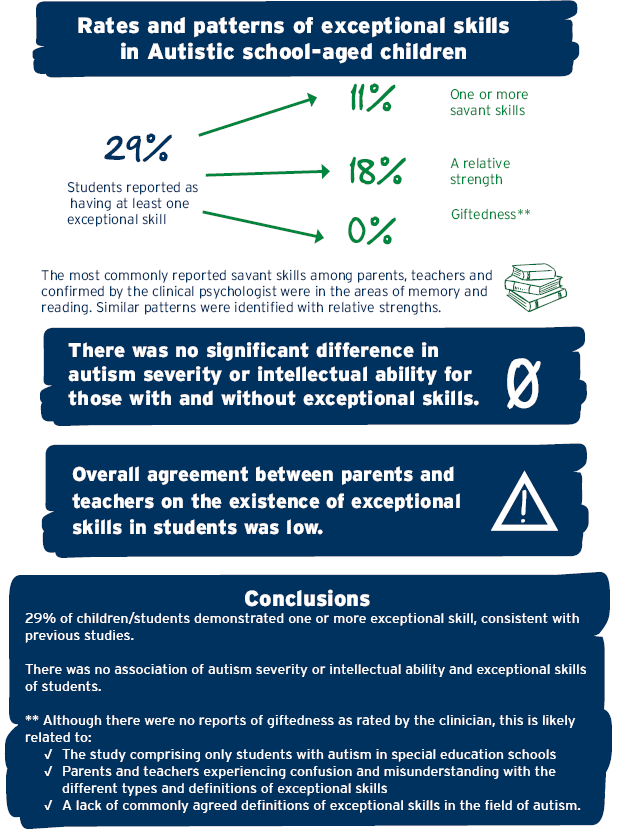Why
Research has consistently shown that Autistic individuals have poorer educational, employment and quality of life outcomes than non-autistic adults. Most interventions to date are deficit-based and focused on identifying and then attempting to develop areas of weakness. However, all Autistic individuals have areas of relative strength and some demonstrate exceptional skills in some areas. Using a strengths-based approach to educating Autistic children may equip them to utilise these skills in ways that foster greater inclusion and a better quality of life in adulthood.
How can we assist educators to better understand the strengths and exceptional skills of Autistic students? How can we assist educators to develop programs that support these students?
The research
Parents/carers and teachers of Autistic students attending one of four Aspect autism-specific independent schools were asked to complete an online survey to identify students with:
- Relative strength – an unusually high ability in a specific skill at a level that is not remarkable or rare for any person of any age, but it is significantly above a child’s overall abilities or developmental level
- Savant skill – an unusually high ability in a very specific skill at a level that is far beyond what is commonly seen in any person at any age – it is a rare, remarkable skill that appears to defy explanation
- Gifted – a high level of ability in one or more areas that is not rare or remarkable for any person of any age, but it is much higher than most children of their age (i.e. in the top 10% of all children of their age)
This study examined the:
- Rates and types of exceptional skills in Autistic school-aged children attending autism-specific schools (Aspect)
- Associations between exceptional skills with autism severity and intellectual disability
- Level of agreement between parent/carers and teacher reports of exceptional skills.
For information regarding each child’s/student’s autism severity, parents also completed the Social Responsiveness Scale. Cognitive level was determined by review of previous cognitive assessments or with an updated assessment using the Wechsler Abbreviated Scale of Intelligence (WASI II; Wechsler, 2011).
Parents were interviewed by a clinical psychologist to gain further insight in relation to reported exceptional skills, and to assign a final rating of exceptional skills, according to the study criteria.
What we learnt

Find out more
Media
- ABC radio: ‘Harnessing Autistic children's exceptional abilities' (30 May 2021)
Making a difference
The outcomes or impact of this study will inform the development of professional development for teachers in Aspect schools and improved information and support for parents regarding exceptional skills in Autistic students.
In Individual Plan Meetings, teachers should ask parents specifically whether their child displays exceptional skills, which may not be directly related to the academic curriculum. If present, measures to better identify and assess these exceptional skills should be completed, and then the exceptional skills included in students’ Individual Plans.
ARCAP is currently developing further studies examining the identification and assessment of strengths/exceptional skills in Autistic students and the inclusion of these skills in students’ Individual Plans.
Research team
Dr Trevor Clark, Aspect Research Centre for Autism Practice (ARCAP)
Vicki Gibbs, ARCAP
Kaaren Haas, ARCAP
Ainslie Robinson, ARCAP
Griffith University, Brisbane
University of New South Wales
Started
2018
Ends
2020
Funding
Aspect, and Neil and Norma Hill Foundation

